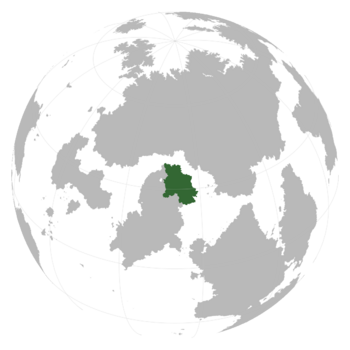Oldirian Union: Difference between revisions
Jump to navigation
Jump to search
Content added Content deleted
mNo edit summary |
mNo edit summary |
||
| Line 42: | Line 42: | ||
|leader_name1 = [[Ossan Nemesoz|Ossan Nemesöz]] |
|leader_name1 = [[Ossan Nemesoz|Ossan Nemesöz]] |
||
|leader_title2 = President of the Kárdún Örsí |
|leader_title2 = President of the Kárdún Örsí |
||
| − | |leader_name2 = [[Tolya Ortur|Tólya |
+ | |leader_name2 = [[Tolya Ortur|Tólya Órtúr]] |
|legislature = [[Government of the Oldirian Union|Kárdún Örsí]] |
|legislature = [[Government of the Oldirian Union|Kárdún Örsí]] |
||
|upper_house = <!--Name of governing body's upper house, if given (e.g. "Senate")--> |
|upper_house = <!--Name of governing body's upper house, if given (e.g. "Senate")--> |
||
Revision as of 16:12, 29 March 2023
Oldirian Union of Tzalist States Kűtzeźüz Öldírí | |
|---|---|
|
Flag | |
Motto: "In Unity there is Valor" | |
Anthem: "State Hymn of the Oldirian Union" | |
 The Oldirian Union (dark green) on Jotunnheim | |
| Capital and | Oszújú |
| Official languages | Dirhassian |
| Recognised national languages | Cernian Vezdali (see Languages for a full list) |
| Demonym(s) | Oldirian |
| Government | Federal Tzalist dominant-party parliamentary socialist republic |
• President | Ossan Nemesöz |
• President of the Kárdún Örsí | Tólya Órtúr |
| Legislature | Kárdún Örsí |
| Area | |
• Total | 1,368,947 km2 (528,553 sq mi) |
| Population | |
• 4627 CY estimate | 81,602,000 |
• Density | 59.61/km2 (154.4/sq mi) |
The Oldirian Union (Dirhassian: Kűtzezsüz Öldírí [ky:d͡zeʑʏs̻ œlði:ɾi:]), officially the Oldirian Union of Tzalist States, is a federal tzalist state located in Northern Etzavaz. It was founded in 4593 CY after the Oldirian revolution, which led to the Black Wars and the subsequent collapse of the Kingdom of Oldiria. It is composed of a union of states for each of the various peoples inhabiting the union.
